Antwayn Hunter Is Here to Make Friends
by Catherine Kane • April 7, 2023

Jerome Paulos
Growing up, Antwayn Hunter spent his summers watching cop shows with his grandfather.
“I loved the excitement of catching bad guys,” he said.
But it wasn’t until there was a drug raid down the street from his great-grandmother’s house that he ever considered becoming a police officer himself.
“I remember watching them go into the house and I thought ‘oh yeah, I want to do that,” Hunter said.
A week after the September 11 terrorist attacks, he graduated from the Kansas City Police Department Training Academy. At just 21 years old, he became an Undercover Narcotics Investigator with the department and spent a year selling “every drug except meth” undercover on the streets of Kansas City.
“If you crush up macadamia nuts, it looks like crack. That’s what we would ‘sell’ to [addicts] in drug houses,” he said.
Since his macadamia nut days, Hunter has worked as a tactical response officer in Dakota County jails, a security supervisor for the Minnesota Twins at Target Field, an emergency response manager in a school for special education students in the West Metro area, and most recently, as the Safety and Security Manager at Project for Pride in Living. He is also a part-time officer in the Macalester Department of Public Safety.
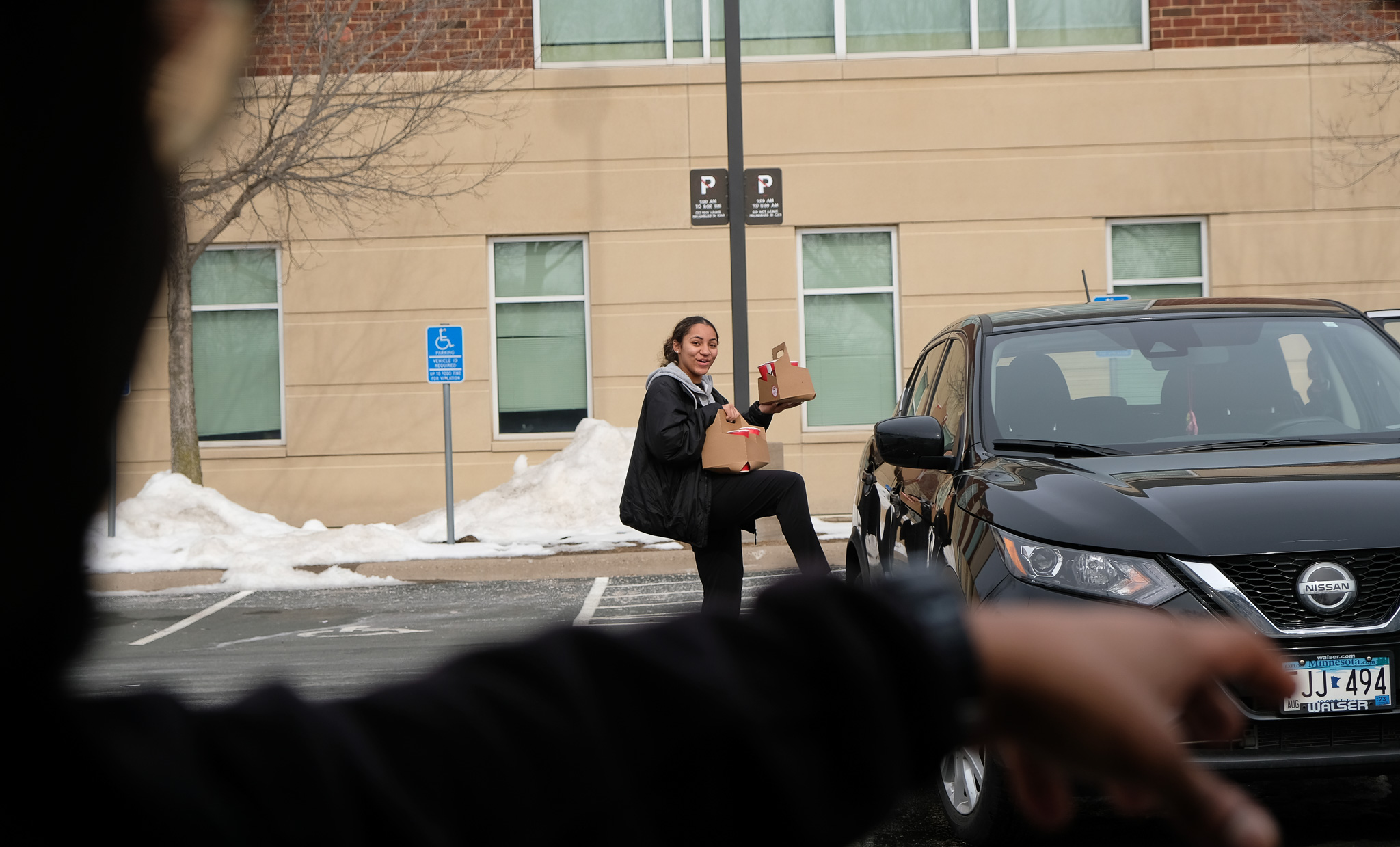
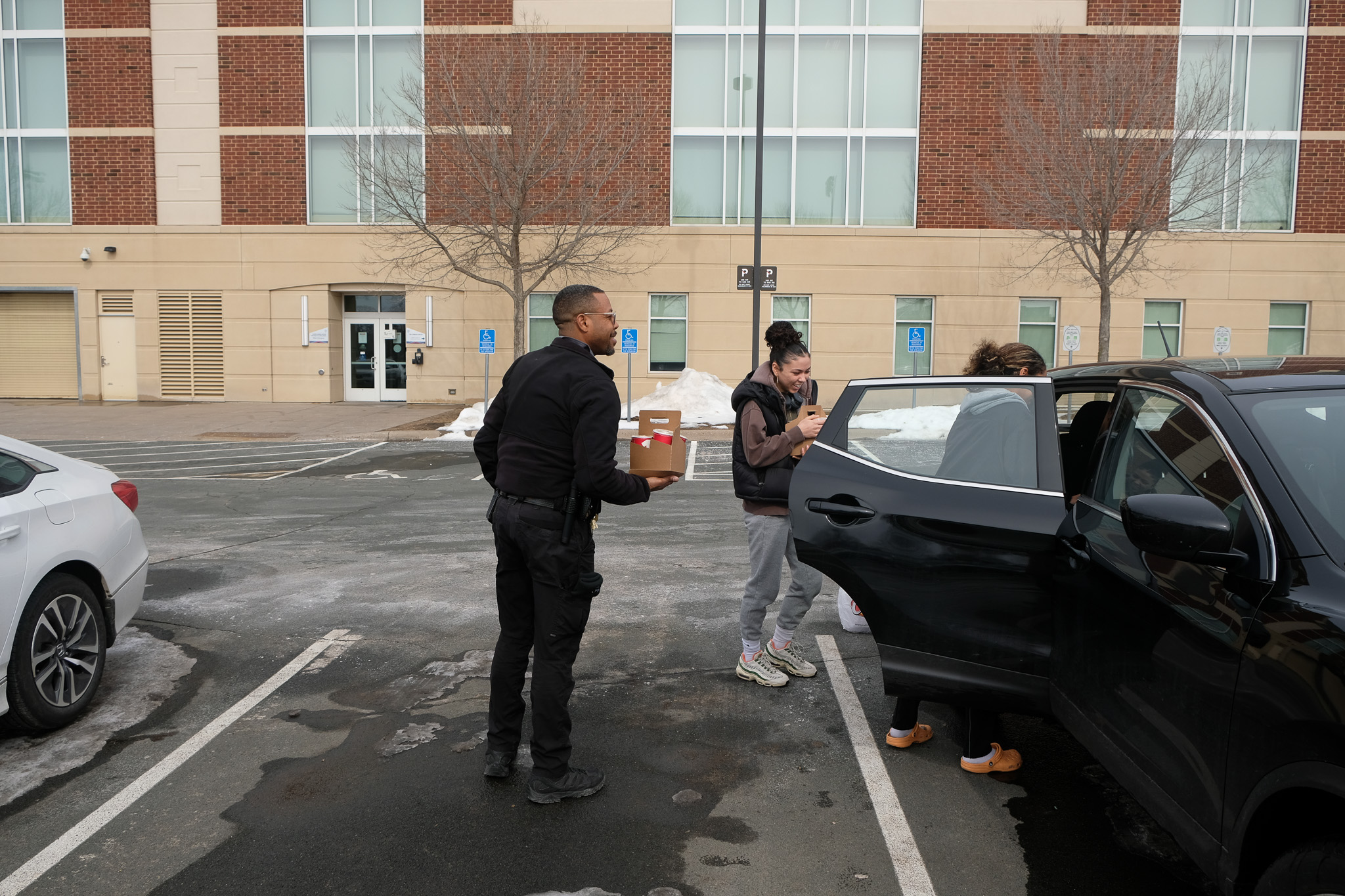
Hunter helps Jaeden Sims ’26 with her drinks.
Jerome Paulos
However, his definition of “part-time” is pretty loose.
“I work around 30 hours a week at Macalester,” he said. Hunter has been with Macalester Public Safety for two years. He’s part of the re-imagined department that Director of Public Safety, Jim Kurtz, has been building for the past five years.
“I knew Antwayn because we worked together in a school district,” Kurtz said. “I asked him to join me here because I knew about his law enforcement background.” Kurtz has been on a mission to remake the Macalester Public Safety Department in his tenure at the college. When he was hired, the department was staffed by a contract security firm.
“I knew we had to take it in house,” Kurtz said. “The contract security guards we were getting were not cutting it.”
All the public safety officers currently on the force were hired in the last five years by Kurtz, with the exception of Captain Bill Collumbien. Currently, the department has four full time officers and nine part time officers.
Paul Munoz, one of the part time officers, often works weekend mornings with Hunter. They enjoy each other’s company during the typically slow early mornings. Hunter describes Munoz as “the nicest guy I know.”
“I can start swaying towards disgruntlement,” Hunter said. “Paul keeps me positive.”
The affection is mutual.
“Everybody loves Antwayn,” Munoz said.
The 6am to 2pm weekend shifts often means covering athletics events, a real treat for Hunter especially during the basketball season.
“I’m a real basketball fan myself,” he said. On a bitterly cold and snowy Saturday in November, Hunter was on duty for the men’s basketball home game against Augsburg.
“There can be a lot of foolery with Augsburg,” Hunter said. “It can turn into a St. Paul versus Minneapolis type situation.” At the Leonard Center, he seemed to know everyone. Upon seeing Hunter, Gregg Olson, the men’s soccer coach, interrupted his meeting with a prospect.
“Antwayn!” he shouted. “I’ve got something for you.” Hunter followed Olson back to his office where the coach enthusiastically gave him soccer team merchandise.
“There are definitely perks of working all the games,” Hunter said. Donnie Brooks, the athletic director, said Hunter’s relationship with the athletic department has created greater trust between athletes and public safety.
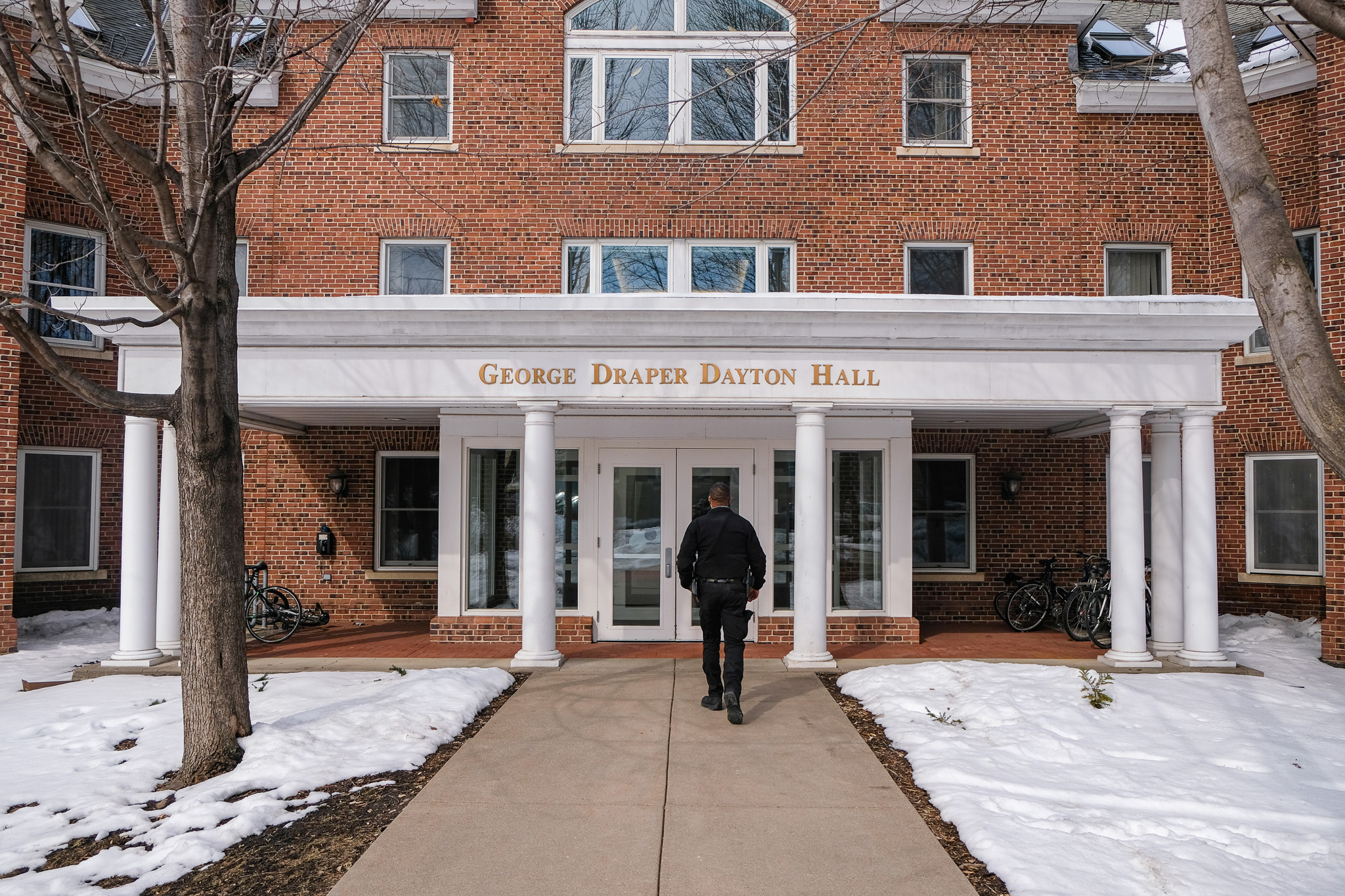
Jerome Paulos
“If there is ever something going on with an athlete on campus, Antwayn is my first call,” Brooks said. “We feel like we have a direct connection to Public Safety.” Brooks’ wife and two kids were also at the Augsburg game. Hunter took his eyes off the game for a few moments to play with Brooks’ young son.
“Antwayn diffuses situations,” Brooks said. “That’s the personal qualities he brings to the work.” As the Macalester players came off the court at half time, many waved to Hunter and he returned their greetings with a nod or clap on the back. College president Suzanne Rivera was also at the game and gave Hunter a friendly tap on the shoulder.
“Hey prez,” he responded with a smile.
On the way out of the Leonard Center, Hunter ran into Donnie Brooks’ wife, Shevie.
“I call her boss lady,” Hunter said. “She’s the athletic director’s wife. She runs the show around here.”
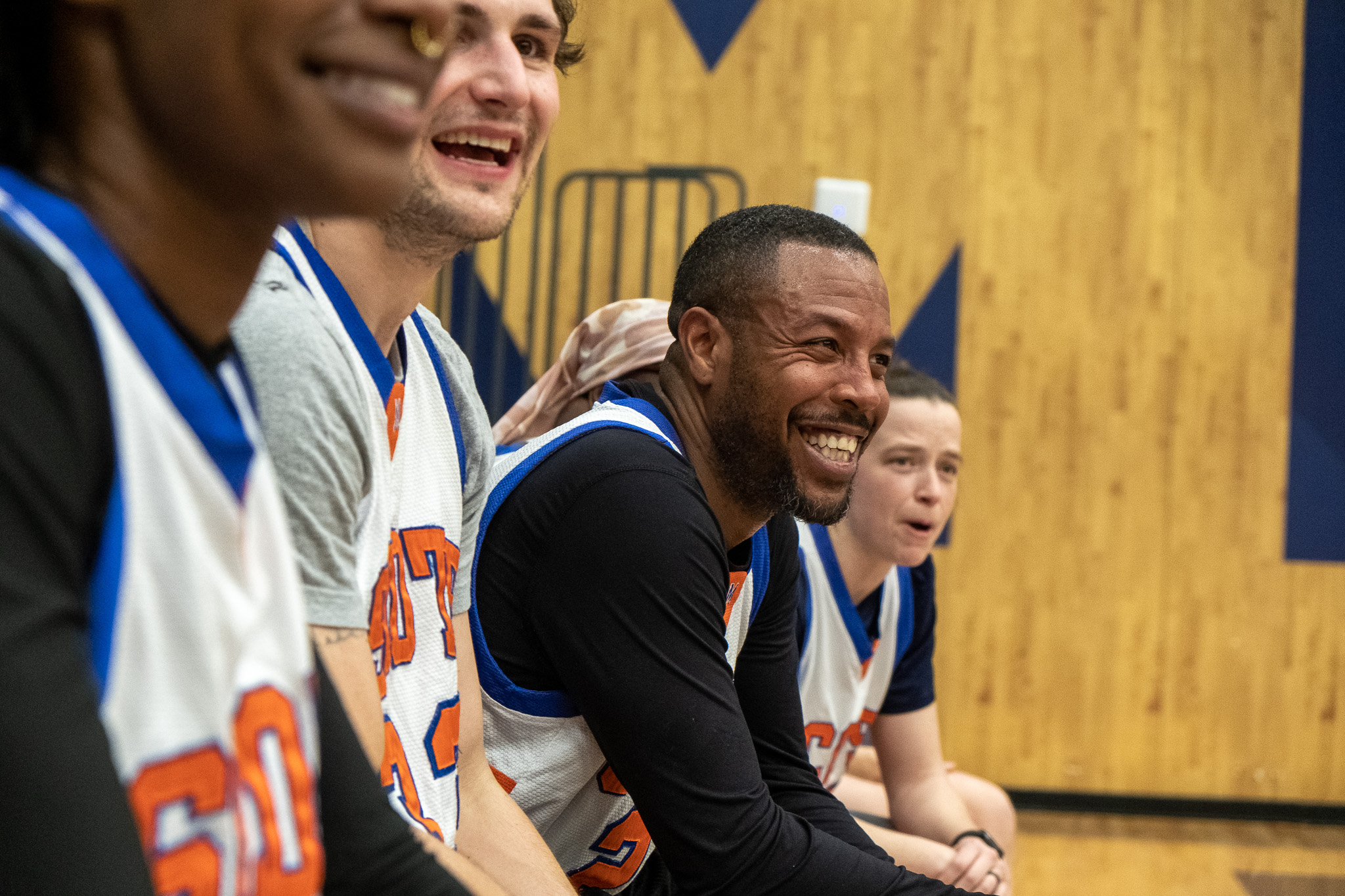
Hunter played in a charity basketball game supporting YouthCare.
Jerome Paulos
Sergeant Connor Christenson, who is third in command at Public Safety, said Hunter’s ability to build rapport with students and staff is what makes him so valuable to the department.
“Antwayn is right in line with what we’re trying to do,” he said.
Christenson has been with the department for four years and has witnessed public safety’s transformation under Kurtz. Like Hunter, he used to work in law enforcement. Christenson was with the Roseville Police Department for a year after graduating from Saint Mary’s University with a degree in criminal justice. He said Hunter’s background in police work makes him feel more confident that he can handle tense situations.
“It’s comforting to know we have officers who won’t be in over their heads,” Christenson said.
When Hunter was a cop in Kansas City and later a tactical response officer in Dakota County, his day-to-day was dealing with addicts, drug kingpins, and suicidal inmates. At Macalester, his nemeses are bike thieves.
“You got people around here with a $2,000 bike and an $8 lock from Target,” he said.
Public safety is the “junk drawer” of Macalester, as Christenson describes it. They get calls for just about everything. Kurtz said a student recently called because they couldn’t get a jar of peanut butter open. Kitchen smoke detector calls are fairly common.
“Nine times out of ten someone just burned their ramen,” Hunter said. “I don’t know how, but they did.”
Hunter said the joy in his line of work comes from interacting with community members.
“I like the fact that I have to use my brain. I have to talk to people,” he said.
In his role overseeing security at affordable housing non-profit Project for Pride in Living (PPL), he often has to deal with residents who may be experiencing mental health or addiction issues. In a recent incident, a schizophrenic woman who had caused extensive damage by attempting to break through her walls to access her neighbor’s apartment was refusing to leave upon PPL’s request. Instead, she moved her entire apartment into the building’s community room, even swapping the locks on her apartment door and the community room door. Hunter was called in to try to get the woman out.
“She answered the community room door and when I walked in she had all her stuff in there,” Hunter said. “She even put all her makeup in the bathroom. It was crazy.” He spent time talking and negotiating with the woman and by the time other PPL management arrived, she was hauling her mattress to the elevator.
“It’s all about communication with the residents,” he said.
His experience negotiating with people in crisis comes from his time in the Dakota County Sheriff’s jail tactical response unit.


Public Safety has a small office in the basement of Janet Wallace.
Jerome Paulos
“When inmates would barricade themselves in their cells, they would call us in to get them out,” he said. He also worked as a gang investigator in the jail, making sure rival gang members were not housed near each other.
“Working there was hard,” he said. “After a while, you start feeling like you’re in jail.”
Hunter experienced a similar loss of identity when he was an undercover drug investigator in Kansas City. Because of the sensitive nature of his job, few people knew what he actually did, limiting the outlets he had to talk about it. He said it made him feel as though he wasn’t a cop.
“You’re hanging out with bad guys so much you start feeling like one,” he said. While Hunter was in the police academy, a three-year-old, known as Precious Doe, was murdered in Kansas City. Her decapitated body was found in a wooded area, leading police on an extensive search for her head in hopes of identifying the remains. The police academy trainees, including Hunter, were called in to search for the head. He remembers the assignment causing great distress among his classmates.
“They brought in counselors to talk to us about it,” he said. “People were really upset.”
The stress of seeing tragedy and crises day in and day out took its toll on Hunter when he was working in law enforcement full time. He’s been sober for almost nine years, but used to drink to cope with the demands of his job.
“I’ve started to learn I need time to separate myself from it all,” he said. “I can’t put your bad day on me.” He’s incorporated an early morning dog walk into his daily routine.
“I leave my cell phone at home. Just me and the dog,” Hunter said. Discussions around mental health were rare when Hunter began his law enforcement career twenty years ago. He said there was a great deal of shame and stigma that surrounded talking about how the job affected people.
“People slept on secondary trauma — it’s a real thing.”
His interest in mental wellness extends beyond just his fellow officers. While working at a special education school district in the West Metro area, he created a program that replaced SROs with a new position: Student Safety Coaches. The district, Intermediate District 287, draws students with special education needs from eleven school districts, meaning the SROs stationed in the schools were never from the community the kids were from. Hunter said the SROs also wore tactical uniforms, sending the wrong message to students.
“People were thinking: ‘this school isn’t safe’ because we have GI Joe walking around,” he said.
The Student Safety Coach Model uses “trauma-sensitive and healing centered behavior practices” to “decriminalize student mental health” and “reduce racial trauma for students of color,” according to ID 287’s website. The program has significantly reduced arrests in the district’s schools since its start in 2017. The Student Safety Coach model received state-wide recognition and has been implemented in other districts in Minnesota.
Hunter started in ID 287 as a paraprofessional, working directly in the classrooms with students and teachers. After being noticed by then-head of security for the district, Jim Kurtz, he took a job as the Crisis Prevention and Response Manager, working alongside Kurtz to create emergency preparedness plans and developing the Student Safety Coach Model. When Kurtz became Macalester’s Director of Public Safety, he knew just the person to ask to join the force.


Hunter sometimes sneaks into concert halls and practice rooms to play paino.
Jerome Paulos
“We need guys like him,” Kurtz said. “I wish I had a whole army of Antwayns.”
Hunter has brought his mental health focus to Macalester as well. He’s taken up training other officers in how to deal with students in crisis, a major part of the job especially coming out of the pandemic.
“Talking about mental health is the thing now,” Hunter said.
Partly to protect his own mental wellbeing, he refuses to take negative interactions with people personally. Somehow, he even finds a way to build rapport with people he’s arrested or met undercover. While working at a Twins game, he ran into a man he frequently bought drugs from while undercover in Kansas City. Hunter said the man called out his undercover street name from the stands of Target Field.
“They finally got you out of Westport!” the man said. Westport is a neighborhood in Kansas City.
Hunter’s alias was Antonio Vargas, the same name of an actor who played ‘Huggy Bear’ in the 1970s TV show Starsky & Hutch. Thus, his street name was ‘Huggy.’
“I hadn’t heard ‘Huggy’ in a long time,” Hunter said, recalling the Twins incident.
‘Huggy’ is an understandably comical name for a police officer, but Hunter’s “soft side” is easy to pull out, especially when he’s talking to students. Luna Johnston, one of the co-heads of Macalester’s Outing Club, knew Hunter by name when she was getting van keys for a Saturday Outing Club excursion. The two joked and chatted as Hunter got the keys. Johnston first met him when he unlocked stairwell access to a radio antenna on campus for her and later said “hi” to her at Café Mac.
“I felt so special,” she said of the Café Mac encounter. “He remembered my name!”
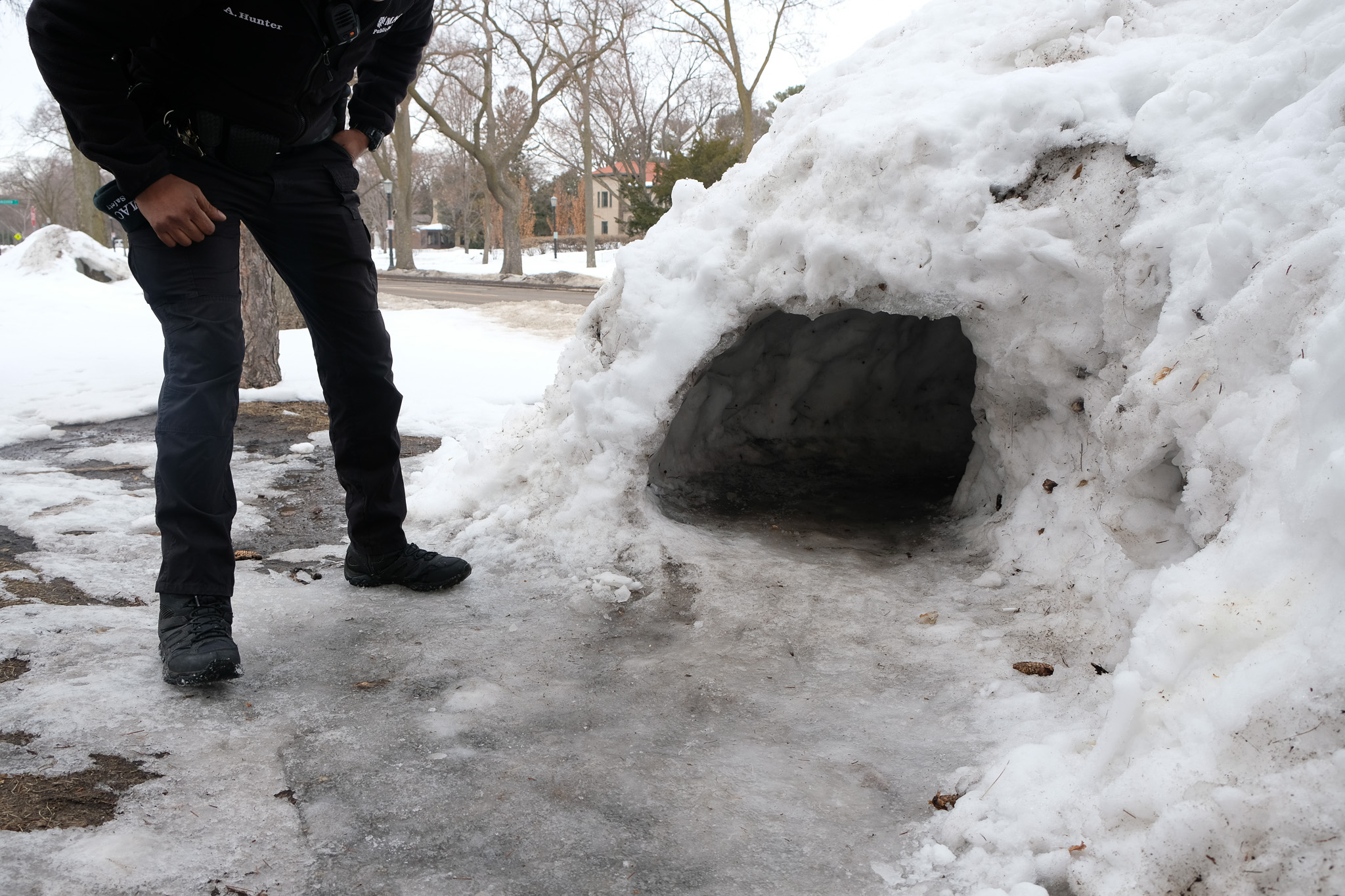
Hunter inspects a student-constructed igloo on the ‘weedian.’
Jerome Paulos
Hunter also takes a softer than expected stance on one of Macalester’s greatest urban legends: the so-called “weedian.” The claim goes that because the median on the eastbound side of Summit Avenue across from Dupre Hall is technically ‘off campus,’ Macalester Public Safety cannot enforce the marijuana-free campus rule there.
“We are well aware,” Hunter said of the legend. “It’s not true.”
He said the department’s practice is to not intervene, break up, or arrest pot-smokers on the weedian unless they are causing a disturbance. By November, enough snowfall had accumulated to build igloos that students smoked inside of; Public Safety received calls from neighbors asking for officers to take the igloos down, which they declined to do.
After being out of law enforcement for a number of years working at ID 287 and a food insecurity non-profit, he hesitated after getting the call from Kurtz to come to Macalester. It was October 2020 and animosity towards police was high, especially at Macalester. Eventually, he came to the conclusion that he wanted to show his community what good policing looks like.
“I needed to get back in uniform,” Hunter said. “I’m a work-a-holic.” His parents, who live in Minneapolis, are always trying to get him to work less.
“My mom tells me I need to get out more,” he said.
The family’s move from Kansas City to Minneapolis gave seven-year-old Hunter a greater awareness of his Black identity.
“I had never been around so many white people,” he said of the move. “In Kansas City, we lived in a Black neighborhood.” Despite being one of the few officers of color in the Public Safety department, he said the culture is one of diversity of backgrounds and experiences. He also appreciates the activist spirit of the students on campus.
“Everyone is fighting for something here,” Hunter said. “I love it.”
Hunter acknowledges there are still things that need to change about law enforcement, especially on the mental health and de-escalation front. He says he is still working out how to manage difficult and unpredictable situations he encounters at PPL and Macalester. But, his purpose remains the same.
“I’m going to help as many people as I can.”
Curiosities of Macalester
An occasional email with new stories and discoveries